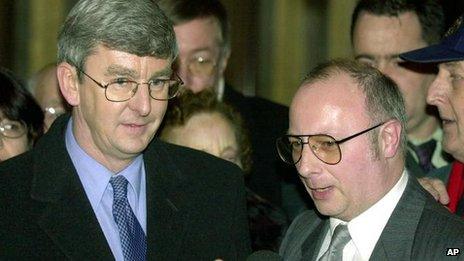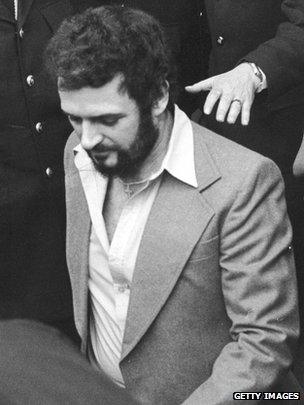Wendy Sewell murder: Pathology report 'contradicts conviction'
- Published

Don Hale successfully campaigned to free Stephen Downing after he was convicted of the murder of Wendy Sewell
A retired police officer has reported Derbyshire police to the Home Office over claims they withheld evidence in a 1973 murder case.
Bakewell man Stephen Downing was convicted in 1974 for killing Wendy Sewell but that was overturned in 2002, external.
Chris Clark said he has uncovered a crucial pathology report showing she was strangled, which was never told to the jury.
The Home Office said it would send any new criminal evidence to the police.
Evidence of police misconduct would be referred to the Independent Police Complaints Commission, the Home Office added.
Derbyshire police said the case was closed after a reinvestigation in 2002.
Mr Clark, a retired Norfolk police officer, said he has sent his findings to the Home Office after obtaining the original pathology report last month.
He said he believed the report showed Mrs Sewell had clear signs of being strangled.
She was found battered in a Bakewell cemetery in 1973 and died in hospital two days later.
Mr Downing admitted beating her with a pickaxe handle but later retracted that statement, only to be found guilty by a jury.

Retired policeman Chris Clark said Peter Sutcliffe, the Yorkshire Ripper, could be connected with Wendy Sewell's murder
"I'm reporting the facts as I see them. The pathologist had evidence in his report that could have exonerated Stephen Downing," Mr Clark said.
He said the pathologist's report showed bruising on her neck consistent with a "knotted ligature" used to garrotte her and a rash in her lungs and airways, possibly caused by strangulation.
Mr Clark said none of this was used in Mr Downing's trial. He added the evidence may mean her death was linked to the Yorkshire Ripper, Peter Sutcliffe.
Mr Downing was 17 at the time of Mrs Sewell's murder but was assessed as having a mental age of 11.
His father Ray Downing and Matlock Mercury editor Don Hale campaigned for his release and in 2002 the Court of Appeal found his conviction unsafe because of "procedural reasons".
Mr Hale said the pathology report directly conflicted with the evidence the police presented at the time and called for an independent investigation into the murder.
"This information was available within two or three days of Mr Downing being arrested and it completely contradicts this so-called confession," he said.
But Derbyshire police said the murder was reinvestigated following the quashing of the conviction and it considered the matter closed.
"All possible lines of inquiry were exhausted during the re-investigation. Twenty two people were ruled out of the enquiry but officers were unable to eliminate Stephen Downing as a suspect," a spokeswoman said.
She added there was no evidence to suggest Peter Sutcliffe - the Yorkshire Ripper - was involved.
- Published22 November 2013